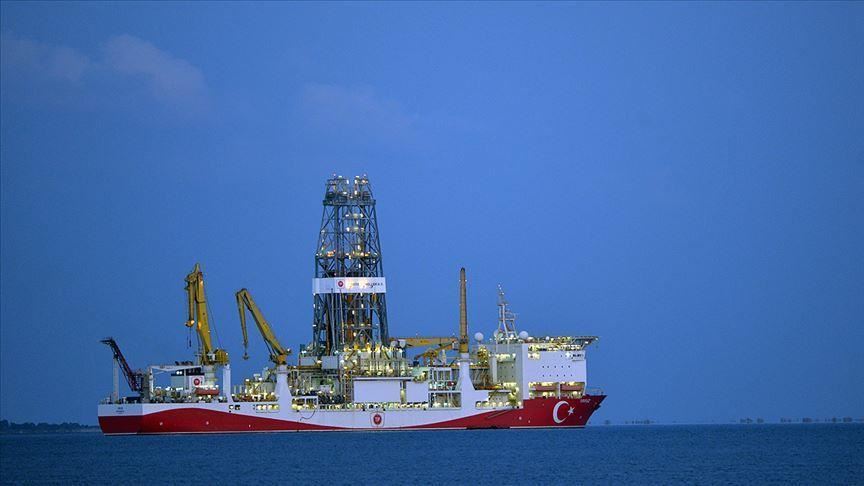ID :
564579
Mon, 05/04/2020 - 16:44
Auther :
Shortlink :
http://m.oananews.org//node/564579
The shortlink copeid
Turkey intensifies E. Med. drilling despite COVID-19

IZMIR, Turkey
Turkey has intensified hydrocarbon exploration and drilling activities in the Eastern Mediterranean despite the COVID-19 pandemic, which along with low oil prices has caused the temporary suspension of activities of foreign oil companies in the region.
Despite the negative consequences of the pandemic on drilling plans in the region, Turkey is expanding its operations. Turkey is conducting exploration activities in the Eastern Mediterranean with two drilling vessels Fatih and Yavuz, along with Oruc Reis and Barbaros Hayrettin Pasa seismic vessels.
Fatih drilling vessel is set to continue its operations in the Black Sea and make its first drilling in the region in July.
Turkey's third drillship, Kanuni, also arrived in Tasucu, Mersin, a coastal city in the Mediterranean region of the country on March 15.
The novel virus led to a sudden global economic downturn and a corresponding fall in global oil prices. The collapse in prices has been further supported by the oil price war between the world's two biggest oil producers, Saudi Arabia and Russia, following OPEC and non-OPEC countries' failure to reach an agreement in March to curb oil production.
The impact of COVID-19, coupled with low oil prices, has affected exploration and drilling activities of global oil companies and resulted in revisions or temporary suspensions to these programs, including those in the Eastern Mediterranean.
ExxonMobil has put its drilling plans in offshore Cyprus on hold from April 13, due to the COVID-19 outbreak and with the unpredictability in international markets.
Likewise, international media outlets reported the drilling programs of French-Italian consortium; Total and ENI, are also postponed for the planned three wells in 2020 and six wells in the following two years.
On March 25, Italian company, ENI announced the revision of its 2020-2021 plans. The revised projects include mainly upstream activities, particularly production optimization and new project developments scheduled to start in the short term.
"Collapse in oil prices has resulted in appetite loss"
Mehmet Efe Biresselioglu, head of the Sustainable Energy Division at the Izmir University of Economics, told Anadolu Agency in an exclusive interview that exploration and naval vessels are leaving the Eastern Mediterranean after the COVID-19 outbreak.
"The collapse in oil prices has resulted in an appetite loss for international actors in the region," he said.
"We can say that countries that adopted an inward-looking policy due to COVID-19 have given pause to their plans in the Eastern Mediterranean. However, this does not eliminate the possibility of a situation change as the virus diminishes," he noted.
Before the pandemic, many countries were developing revisionist policies towards key regions in the world including the Eastern Mediterranean and the Middle East, according to Biresselioglu.
Biresselioglu stressed the impact of Turkey's active policy and increased presence in the region.
"Turkey has followed a similar path and developed appropriate policies through bilateral cooperation and has achieved important gains in this region. If Turkey can get through this crisis with the least possible shortfalls, its advantageous position could be strengthened even more," he said.
Turkey and Libya's UN-recognized Government of National Accord (GNA) signed two separate pacts on Nov. 27 last year; one on military cooperation and the other on maritime boundaries of countries in the Eastern Mediterranean.
The maritime pact asserted Turkey's rights in the Eastern Mediterranean in the face of unilateral drilling by the Greek Cypriot administration, clarifying that the Turkish Republic of Northern Cyprus also has rights to the resources in the area. The pact came into effect on Dec. 8.
"This pact has been a game-changer and we will continue to see further positive results of this agreement. I believe this pact will contribute to a possible diplomatic solution and adoption of a win-win principle," Biresselioglu said.
He added that the third drillship, Kanuni, has entered Turkish waters in mid-March, and will be ready to start its operations following a relaxation on measures against the novel virus.
"International companies can work with Turkey"
Oguzhan Akyener, president of Turkey Energy Strategies & Politics Research Center (TESPAM), added that COVID-19 affected all exploration, drilling and service companies in the region.
Many oil companies currently do not have the budget for "risky business," Akyener said and added that the situation for Turkey is different. "Turkey continues its exploration activities in the Eastern Mediterranean with the support of public finance in its maritime zone.”
He suggested that international companies could work with Turkey, describing it as a “most advantageous country in the region both financially and logistically.”
"New discoveries by Lebanon could create new equilibrium"
At the end of February, Lebanon officially announced the start of the country's first oil and gas exploration operations in its Exclusive Economic Zone.
The results of the drilling, located nearly 30 kilometers offshore Beirut, were projected to be reported in June 2020. However, the Minister of Energy and Water, Raymond Ghajar, recently announced that no commercially viable amount of gas was found in block 4. But he added that there is a possibility for a larger find in Lebanon's waters because several small pockets of gas were uncovered during the drilling.
In January 2018, two exploration and production agreements for blocks 4 and 9 were signed between Lebanon and the consortium exploration team comprising Total, ENI and Novatek.
Akyener said that any new discovery by Lebanon could bring about new equilibrium in the region, adding that currently, all eyes are on Lebanon's offshore drilling operations.
"Therefore we need to use our advantages in the Eastern Mediterranean and build our future here accordingly," he concluded.





